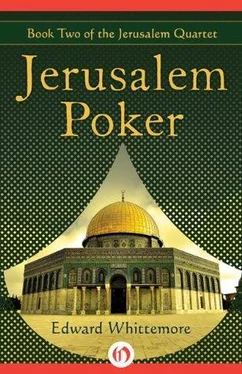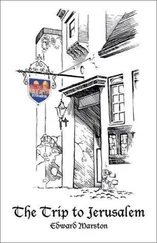But he had shared the secret with Joe because Joe had not only befriended him but even believed the things he said, the first person to have done so in two thousand years, which had mystified Haj Harun in the beginning.
Why do you believe what I say, he had asked, instead of beating me when I say it? That's what everyone else does. They call me an old fool and beat me.
No reason not to believe you, Joe had answered. I haven't been long in our Holy City, everybody's Holy City, but I've learned enough to know you have to accept twists here the way you might not elsewhere.
Different kind of place, that's all. Eternal city and so forth, daft time spinning out of control for sure on top of the holy mountain. Now you say you've lived here three thousand years and who am I to say you haven't? No one, that's who. A man has to be in charge of his own memories all right, otherwise nothing would work. So if you say it I'll believe it and that's the shape of things.
There had been tears in Haj Harun's eyes then, and ever since he had been eager to reveal all he knew to his new young friend. The only problem was that Haj Harun was so old the years seemed to slip and slide together for him, and he could seldom remember what he knew.
Munk Szondi was still gazing at the tall antique Turkish safe in the corner.
What does the old man keep in it? he asked.
Now there's an item for you, said Joe, and would you believe me if I told you? The past. Yes that's right.
He keeps the past, no less, in that tall and narrow safe.
Munk smiled.
Is that so?
It is indeed. What he's got in there is three thousand years of history, the Holy City's history, and what do you think of that? You see he's by way of considering himself the custodian of Jerusalem, the one and only legitimate article. And me myself, I'm by way of thinking he's right.
Munk shuffled the cards.
Who appointed him to this exalted position?
Self-appointed he was. Had to be. No one else had been around long enough to do the honors. Not that he wasn't voted into the job too, he was. By general acclamation of the citizenry, accompanied by great applause.
When was that? asked Munk.
Well let's see, it must have been a little before 700 B.C. Seems about that time the accursed Assyrians were ready to make their move in their monstrous chariots, accosting the lands to the north on their way down to a-conquer Jerusalem and everyone in the city was a-scared and agog at the danger. Commerce and the assorted religions were coming to a standstill, don't you see, so maybe soon there would be no Holy City at all here, nothing but gnashing of teeth and lamentations. Do you follow me, Munk?
Yes.
Now first you have to remember Haj Harun wasn't then at all what you see today. He was a greatly respected figure here, a veritable local hero and especially renowned for his oratory. Are you remembering, Munk?
Yes.
All right. He squares his shoulders and strides down into the marketplace to assay the Assyrian situation and assail all doubts and provide assurances or assumptions as the case may be, assuming his role in other words, assiduous defender that he be, just going right out there to arrest the Assyrian confusion with his powerful voice and presence.
Citizens, he shouts, take heart with me.
He stands there smiling and nodding with confidence, shouting this over and over, but his fellow Jerusalemites aren't assimilating any of it. They're just plain scared so there are more teary dirges and dreary threnodies.
The Assyrians are a-coming, scream the citizens.
But we can save ourselves, shouts Haj Harun.
How? scream the citizens.
By hiding the city's sacred objects, shouts Haj Harun.
Well of course, the sacred objects, no one had thought of that. If they could hide the city's precious sacred objects for a while, say a century or two or three, then the Assyrian danger would surely pass as all dangers do and the Assyrians would have to lug their monstrously heavy chariots back up north where the came from. Then the citizens could bring out their sacred objects once more and be as prosperous as ever, a proper Holy City with its proper holy goods in place.
So it's right you are, the sacred objects, and a powerful sigh of relief passes around the marketplace.
Good, scream the citizens, let's hide them for two or three centuries. But where?
Consternation then. Doubt all around. Everyone knows the Assyrians have a dreadful reputation for breaking things up and down to get their hands on sacred objects, especially those of a Holy City, for the Assyrians are nothing if not unholy. So the mob screams again.
Hide them by all means. But where?
Here, shouts Haj Harun in triumph, whipping up his cloak to reveal a gigantic money belt strapped around his waist and a huge shepherd's sack on his back, both previously unsuspected although the citizenry was thinking their hero had looked a trifle overweight and hunch-backed that morning when he got up to address them.
A ruse, they scream. Will it work?
Haj Harun smiles. It will, he shouts. I used the same belt and the same sack in a similar situation some time ago when the Egyptians were coming.
The Egyptians, scream the citizens in dismay, you must have been younger and stronger then. Younger, shouts Haj Harun, but I'm still strong.
A queasy lot, the citizens of Jerusalem, then as now. So many prophets are always passing through here saying this or that is the absolute truth of the matter, and always contradicting each other, that the citizens naturally tend to be suspicious.
Is the money belt big enough? they scream. Is the shepherd's sack? And are you going to sign receipts?
Well Haj Harun shouts he is and all is well and in another minute they're bringing their sacred objects from every corner of the city, jewels and gold in all shapes and sizes and even some wood, and Haj Harun stuffs it all away in his money belt and his shepherd's sack and signs the receipts they wanted.
Then he tries to get to his feet.
Groans from the crowd, groans all around.
Can't you even stand up? they scream. If you have to sit there for the next century or two you're certainly not much of a hiding place.
Well it's hard, God knows. It's the hardest thing your man's ever done but he does it, he manages, he gets to his feet. After all he has to, the future of the eternal city depends on it. So he lets fall his cloak and takes one staggering step and then another, looking fat and terribly deformed, not unlike a Jerusalem merchant trying to waddle away from the marketplace under the weight of his profits.
And just in time, because up there on the ramparts the ram's horns are beginning to sound announcing the imminent arrival of the advance Assyrian assault force, which is to say their ferocious and justly a-feared cavalry.
The mob scatters for cover. The marketplace is empty. Only Haj Harun is left behind because he can't move fast enough. Stumbling crookedly with his burden of public safety, he slips into a side alley. Do you see it, Munk?
Yes.
Good. Well the gates bang open and the dreaded Assyrian cavalry comes thundering down the street shaking the cobblestones, and now your man knows why their accursed cavalry is so justly a-feared. I mean, my God, can you believe it? The Assyrians don't ride horses, that's why. They ride winged lions just like you've seen in the pictures. Great roaring bounding lions with manes a-flowing and wings a-spreading. So it's here come the bloody Assyrians all right. Are you still there, Munk?
Yes.
I thought so. Now here's the difficulty. Your man only thought he was slipping into that side alley.
Actually he wasn't. Actually that side alley was far too narrow to accommodate both him and the gigantic stuffed money belt and the huge stuffed shepherd's sack. Actually he's still out there in the open, Jerusalem's portable altar bearing all the goods, right there in the middle of the street with the cavalry bounding toward him, those wicked winged lions breathing fire and looking for a fresh piece of meat to guzzle. Guzzle meat? Of course they could with that fiery breath of theirs, easily and more. What next, you say?
Читать дальше












